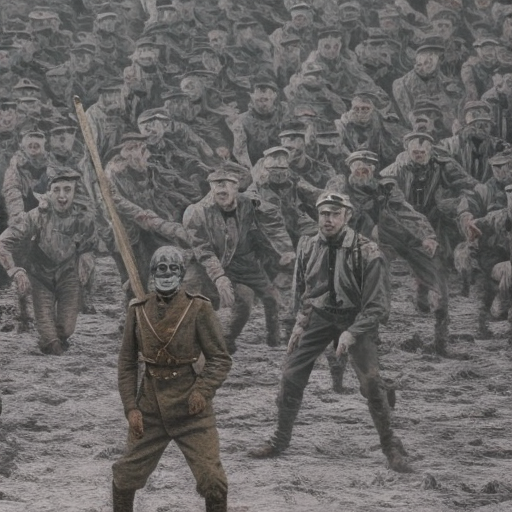One-line Summary:
“Paths of Glory” is a powerful anti-war film directed by Stanley Kubrick that explores the futility and injustice of war through the story of three soldiers accused of cowardice during World War I.
Main Cast and Crew:
- Director: Stanley Kubrick
- Writer(s): Stanley Kubrick, Calder Willingham, Jim Thompson
- Key Actors: Kirk Douglas as Colonel Dax, Ralph Meeker as Corporal Paris, Adolphe Menjou as General Broulard, George Macready as General Mireau
- Music Director: Gerald Fried
- Director of Photography: Georg Krause
- Producers: Stanley Kubrick, James B. Harris
Plot:
“Paths of Glory” is set during World War I and follows Colonel Dax, played by Kirk Douglas, who leads his men on a mission to capture a German stronghold known as the Anthill. The mission is ordered by General Mireau, who expects a successful outcome to further his own ambitions. However, the attack fails, resulting in heavy casualties and a stalemate.
General Mireau, frustrated by the failure, orders his own men to be court-martialed for cowardice to divert attention from his own poor judgment. Colonel Dax, a compassionate and just leader, defends his men and tries to expose the injustice of the situation. As the trial unfolds, it becomes clear that the charges are baseless and that the soldiers are being sacrificed to protect the reputation of their superiors.
The film highlights the dehumanizing nature of war, the callousness of those in power, and the sacrifice of innocent lives for political gain. It explores themes of loyalty, honor, and the moral responsibility of leaders in times of war.
Themes and Motifs:
“Paths of Glory” delves into the themes of injustice, the corrupting influence of power, and the devaluation of human life in the face of war. The film exposes the hypocrisy and brutality of the military hierarchy, where the lives of soldiers are considered expendable for the sake of preserving authority and reputation.
Kubrick employs motifs of trench warfare, the claustrophobic and oppressive environment of the trenches, and the stark contrast between the luxurious lives of the officers and the suffering of the soldiers. The film also explores the psychological toll of war on the soldiers, highlighting the trauma and emotional scars they carry.
Reception and Legacy:
Upon its release in 1957, “Paths of Glory” received critical acclaim for its powerful portrayal of the horrors of war and the moral dilemmas faced by soldiers. Although it faced initial controversy and censorship due to its anti-war stance, the film has since been recognized as a classic.
The film was nominated for the Golden Globe for Best Motion Picture and received numerous accolades from critics and film festivals. Its impact on cinema is undeniable, as it paved the way for future anti-war films and solidified Stanley Kubrick’s reputation as a master filmmaker.
Recommendation:
“Paths of Glory” is a must-watch for anyone interested in thought-provoking cinema that challenges the glorification of war. Kubrick’s direction, coupled with Kirk Douglas’ powerful performance, creates an emotionally charged experience that forces viewers to confront the harsh realities of conflict.
Memorable Quote:
“Gentlemen of the court, there are times that I’m ashamed to be a member of the human race and this is one such occasion.”












